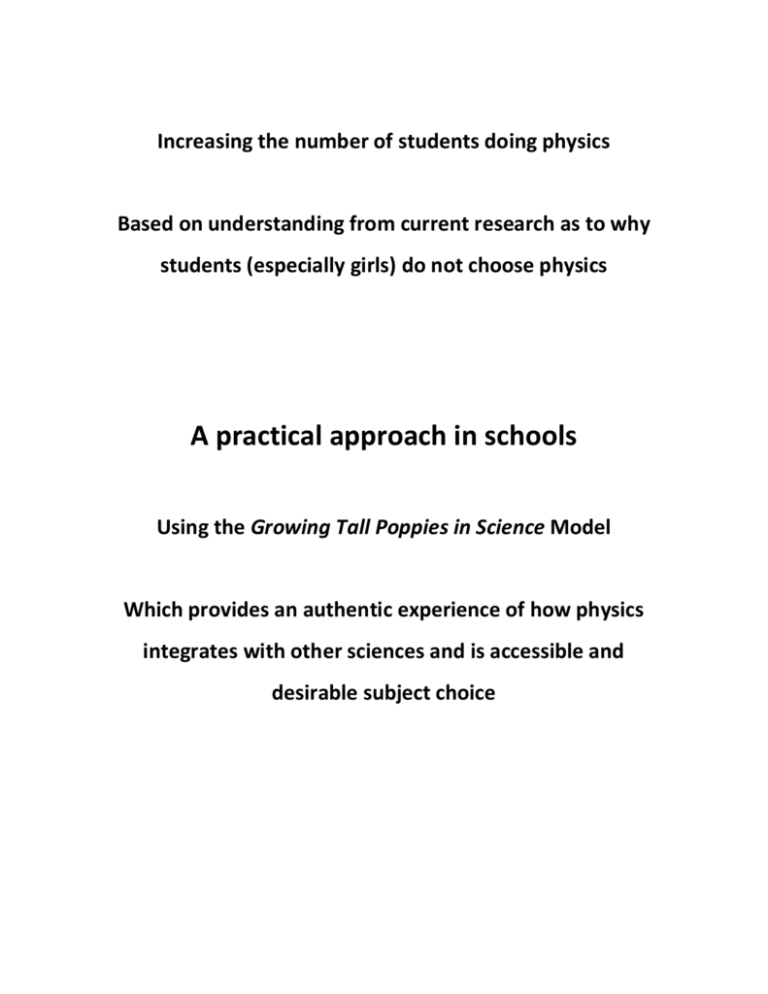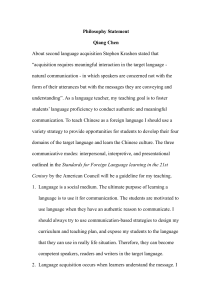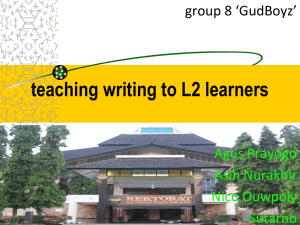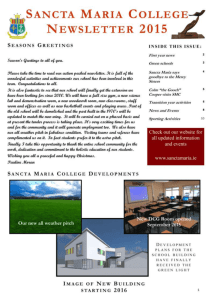The ARC Centre of Excellence for Coherent X-ray
advertisement

Increasing the number of students doing physics Based on understanding from current research as to why students (especially girls) do not choose physics A practical approach in schools Using the Growing Tall Poppies in Science Model Which provides an authentic experience of how physics integrates with other sciences and is accessible and desirable subject choice What brought you here? The ARC Centre of Excellence for Coherent X-ray Science (University of Melbourne) and Santa Maria College, Northcote have developed a partnership to empower girls in continuing with their study of physics to Year 12. The program – Growing Tall Poppies in Science-An authentic science experience, gives students real experiences with the enabling power of physics, and has doubled the number of girls studying physics at Santa Maria College. A longitudinal study identified the program’s impact and results show a statistically significant increase in both students choosing year 11 physics and the retention of those students into year 12 physics. This program will be of value to other schools with small cohorts of physics students and could help increase numbers. Quick Survey Do junior science students easily identify the importance of physics to every day life/activities? Do junior students identify vocational choices that may require physics as a major component e.g. architecture, engineering and then dismiss it because it needs physics? Do students identify doing physics with doing/being good at maths? Do students think you have to be a brain/nerd to do physics? What reasons do students give for not taking physics? What reasons do students give for taking up biology, chemistry, psychology? Is physics seen as pre-requisites; helpful for learning medicine, people reasons, easier? Other? What influences years 9 and 10s to dismiss physics as subject choice for year 11? Bearing in mind the responses to the above; once in year 11 physics what keeps students in, or loses students from physics to year 12? What can you do? On what basis? At which year level? Any other thoughts observations……. What the Educational Research Literature says: Australian Physicist paper In a nutshell - school based physics appears disconnected with what matters to student (careers) and is not easily relatable to understanding of themselves and their bodies such as biology and psychology. Yet the rationale from the VCE physics study design Physics is a theoretical and empirical science, which contributes to our understanding of the physical universe from the minute building blocks of matter to the unimaginably broad expanses of the Universe. This understanding has significance for the way we understand our place in the Universe. This study is designed to enhance the scientific literacy of students in the specialised area of physics. Scientifically literate physics students demonstrate interest in and understanding of the Universe, engage in debates about the nature of evidence, theories and models, and appreciate the value of physics in society. They can describe and use theories and models, propose and investigate hypotheses, collect data, analyse the limitations of that data, draw conclusions, make recommendations, and select and use a range of appropriate technologies and mathematical techniques. The knowledge gained through physics will enhance students’ ability to be innovative and contribute to the intelligent and careful use of resources. This knowledge can be used, for example, in industrial, medical, engineering and technical applications. Knowledge in physics is gained through complex processes; for example, theories developed from studying the ways that matter interacts with matter, and the ways that light and matter interact, have led to innovations in medicine, electronics, energy use, telecommunications and materials science. This study design will assist teachers to provide a curriculum that is interesting and challenging for students with a wide range of expectations, including students who are aiming for medical, engineering, technology-based and science-based careers. This requires pedagogies of engagement in science such as Problem Based Learning, Process Guided Inquiry Learning, Student Centered Learning, and Active Learning pedagogies. Underpinning these pedagogies is constructivism approaches to learning science so that students are able to develop more meaningful models of scientific concepts. However the research tells us that students who are generally able to conceptualize scientific concepts still do not choose the study of physics because they do not perceive its use or relevance to choices they are making and do not perceive the connection physics has for enabling contributions. Thus I would go further and suggest we need to employ an Authentic Learning Pedagogy. At Santa Maria College and associated schools (Euroa Secondary College, Mt Eliza Secondary College, St Catherine’s Catholic Girls College, St Bernard’s College, Star of the Sea, Lady of Mercy Heidelberg, Mercy College, Padua College, current Charles La Trobe College): Growing Tall Poppies: authentic science experiences for year 10 and 11 students Phase 1- Engagement Phase is at Year 10 to engage students with the integrated nature of science and scientific investigations and discovery with physics as an enabling science that works with other sciences to improve things for people; from drug design to engineering the bionic ear. Increased numbers into year 11 physics by 50%. Phase 2- Retention Phase at Year 11 to encourage students to continue the study of physics to year 12. Students undergo targeted project linked to the VCE physics study design to identify how physics principles, large equipment and technology of the Australian Synchrotron and robotics and protein crystallisation at the CSIRO contribute to changing the understanding of disease and drug delivery. Increased retention into year 12 from below 50% to over 80%. My School: What are my needs? Do my students need engaging? Should I Could I use the Authentic Learning Pedagogy/Model? Would this work? Which year level would I target? Would School Leadership support this? What partners do I have or could I form partnerships? Do I need to network with others to ‘hook in’ on what is working? How long does the process take? How would I measure success?






